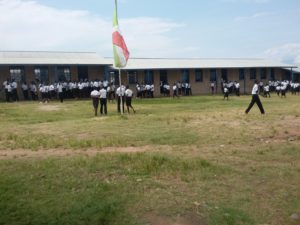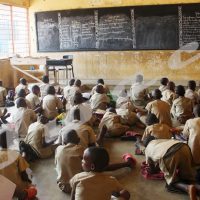Growing evidence suggests that the Basic Education system that was adopted in 2013 yields worse results than the system it came to replace.

Students returning to classrooms after break
End term results of the first year of post-basic education of the new system show that students who came from the old system have performed better than their counterparts of the new system.
This observation goes against expectations that students with the new system training background would perform better since the programme of first year of the post-basic education was devised on the basis of the material studied in the new system.
Starting from 2013, the government of Burundi introduced the Basic Education system that would replace the old one. The new system devotes nine years to basic education after which students go to high school or post- basic school. In the old system, students went to high school after the 10th grade.
The school year 2016-2017 started with the first class of post-basic education. The class combined 10th graders of the old system and 9th graders of the new system.
Teachers and school principals reported prior knowledge and course content mastery differences between students with different educational backgrounds. The end term class results have supported their claims.
A case in point is Lycée Municipal de Kanyosha in Bujumbura where, according to the results of the first term, the first seven of students taking Science courses and the first 13 of the students taking Language courses studied in the old education system.
Course content at the root…
Some teachers put the blame on the course content. Contrary to expectations, educators claim that course content is more similar to material studied in the old system, so that students from the new system lack background knowledge about what they study.
Laurent Nkengurutse, a Biology teacher at Lycée du Lac Tanganyika in Bujumbura says “Biology course content favours students from the 10th grade. Those from the 9th grade of the basic school lack background knowledge of some topics”.
Anicet Maniratunga, the teacher of Mathematics at Lycée Saint Michel Archange, has made the same observation: “Students who came from the old system already know more than their classmates who came from the basic school system”, he says.
But the problem is “complex”
Abbot Louis Mbazumutima, the Rector of Kanyosha Junior Seminary School in Bujumbura, says the cause of the observed problem “is complex”.
He says that the causes include for example, in addition to programme contents, student laziness and lack of interest due to youth employment. “When these young students see that their elders who graduated before have nothing to do, they conclude that studying is irrelevant”, he says.
Marc Bukuru in charge of courses at Lycée Municipal de Kanyosha says that part of the problem is teacher’s clinging on the old teacher-centred practices that were superseded by learner-centred teaching approach introduced with the new school system.
He also says that students from the new system have misconceptions about their background education system due to negative criticisms the system was received with from its introduction.
The new education system is criticized that it was adopted hastily when basic requirements for its success were not yet met.
Even now, the Ministry of Education has not yet provided the course content for the second term that started in the beginning of January 2017.



















 IWACU Open Data
IWACU Open Data

